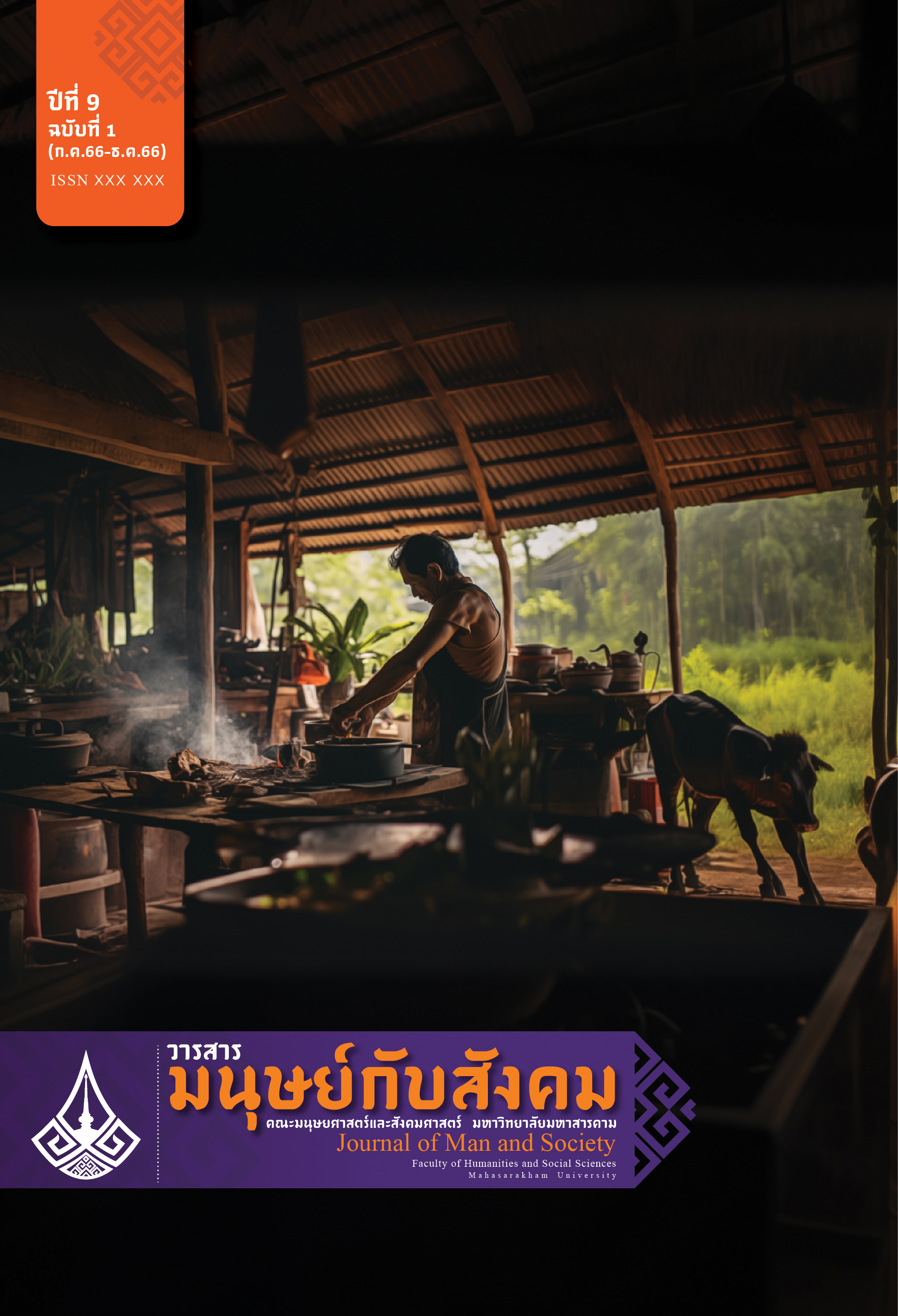โครงการจากไร่สู่ตลาด (FMR) ใน อัคดางาน เคอซอน โครงการพัฒนาสองหน้า
Main Article Content
บทคัดย่อ
การศึกษาชิ้นนี้ชี้ถึงส่วนราชการด้านการพัฒนาจากรัฐบาลญี่ปุ่นและฟิลิปปินส์ให้ความช่วยเหลือโครงการจากสร้างโครงสร้างพื้นฐานจากไร่สู่ตลาดที่ได้รับทุนจากความช่วยเหลือเพื่อการพัฒนาอย่างเป็นทางการ (ODA) ได้อย่างไร ซึ่งโครงการนี้เกิดขึ้นเพื่อลดความยากจน ปฏิรูประบบเกษตรกรรม และเพื่อบรรลุเป้าหมายการพัฒนา
การศึกษานี้ศึกษาแรงกระตุ้น บทบาทความสัมพันธ์ และกระบวนการตลอดจนการบริหารโครงการ และการศึกษานี้ยังวิเคราะห์ว่าโครงการจากไร่สู่ตลาดนี้แก้ไขปัญหาให้ผู้ที่ได้รับผลกระทบจากการปฏิรูปเกษตรกรรมได้อย่างไร จากกรอบแนวคิดเกี่ยวกับ ‘ความปรารถนาที่จะพัฒนา’ โดย ทาเนีย มููเรย์ ลี การวิเคราะห์การวางตำแหน่งแห่งหนของโครงการตลอดกระบวนการจัดการในกรอบแนวคิดการปกครองชีวญาณโดยเสรีนิยมใหม่ (Neoliberal Governmentality) เพื่อเปิดเผยมุุมมองในประเด็นที่่โครงการได้ทำไม่สำเร็จ โครงการจากไร่สู่ ่ ตลาดไม่สามารถทำให้ชีวิตผู้คนได้รับผลประโยชน์ในภาพรวมให้ดีขึ้นได้ การศึกษานี้ใช้ข้อมููลจากหน่วยงานภาครัฐฯ แบบสอบถามจากออนไลน์ การสัมภาษณ์แบบกึ่งโครงสร้าง และสัมภาษณ์แบบกลุ่ม เพื่อหาแรงกระตุ้น วาทกรรม กระบวนความคิด และเทคนิคของหน่วยงานภาครัฐทั้งญี่ปุ่นและฟิลิปปินส์ การศึกษานี้สรุปได้ว่า โครงการนี้มีลักษณะแบบตีสองหน้า กล่าวคือในระดับตื้น โครงการกระตุ้นให้เกิดการเจริญเติบโตทางเศรษฐกิจ ความเข้าใจร่วมกัน และการเอื้อเฟื้อซึ่่งกันและกัน แต่เมื่อวิเคราะห์เชิงลึกแล้วพบว่าการทำงานเชิงตลาดทำให้ผู้เล่นที่ไม่ใช่กลุ่มคนจนเข้ามาแสวงหาผลประโยชน์อย่างไม่เหมาะสมได้
Article Details

อนุญาตภายใต้เงื่อนไข Creative Commons Attribution-NonCommercial-NoDerivatives 4.0 International License.
เนื้อหาและข้อมูลที่ตีพิมพ์ลงในวารสารมนุษย์กับสังคม ถือเป็นข้อคิดเห็นและความรับผิดชอบโดยตรงของผู้เขียนซึ่งกองบรรณาธิการวารสารไม่จำเป็นต้องเห็นด้วยหรือร่วมรับผิดชอบใดๆ
บทความ ข้อมูล เนื้อหา รูปภาพ ฯลฯ ที่ได้รับการตีพิมพ์ในวารสารมนุษย์กับสังคม ถือเป็นลิขสิทธิ์ของวารสาร หากบุคคลหรือหน่วยงานใดต้องการนำทั้งหมดหรือส่วนหนึ่งส่วนใดไปเผยแพร่ต่อหรือเพื่่อกระทำการใดๆ จะต้องได้รับอนุญาตเป็นลายลักษณ์อักษรจากวารสารมนุษย์กับสังคมก่อน
เอกสารอ้างอิง
Arase, D. (1994). Public-private sector interest coordination in Japan’s ODA. Pacific Affairs; Vancouver, 67(2), 171-199.
Dasgupta A., & Beard V. A. (2007). Community-driven development, collective action and elite capture in Indonesia. Development and Change, 38(2), 229–249.
Dean, M., (2010). Governmentality: Power and Rule in Modern Society. second ed. London, UK: SAGE Publications Ltd.
Ferguson, J. (1991). The Anti-Politics Machine:“Development,” Depoliticization, and Bureaucratic Power in Lesotho. Cambridge,
United Kingdom: Cambridge University Press.
Jacoby, H. (1998). Access to Markets and the Benefits of Rural Roads: A Nonparametric approach. Worldbank.org.http :// web.worldbank.org/archivApproache/website01066/WEB/IMAGES/11851832.PDF
Jay, J., Hamilton, A., & Madison, J. (2003). The Federalist Papers. New York, United States: Random House Publishing Group.
Lalu, G. (2019, October 2014). COA: Quezon Town’s P12-M payment for water system disallowed. Inquirer.net. https://newsinfo.inquirer.net/1177492/coa-quezon-towns-p12-mpayment-for-water-system-disallowed
Li, T. (2007). The Will to Improve: Governmentality, Development, and the Practice of Politics. Development and Change, 40(2).
https://doi.org/10.1111/j.1467-7660.2009.01519_5.x
Lyngby, K. (2008). General Study of the Impact of Rural Roads in Nicaragua. Organization for Economic Cooperation and Development. http://www.oecd.org/countries/nicaragua/
Lucas, A. (2016). Elite Capture and Corruption in Two Villages in Bengkulu Province, Sumatra. Human Ecology, 44, 287-300. doi: 10.007/s10745016-9837-6
Menga, F. (2018). Bigger is Better or How governments Learner to Stop Worrying and Love Megaprojects. Studies of Transition States and Societies, 10(1), 3-14. http://publications.tlu.ee/index.php /stss/article/view/350/522
Muller, R. (2019). Governance, governmentality and project performance: the role of sovereignty. International Journal of Information Systems and Project Management. 7(2), 5-17.
Muller, R., Zhai,L., Wang, A. (2017). Governance and governmentality in projects: profiles and relationships with success. InternationalJournal of Project Management, 35(3), 378-392. https://doi.org/: 10.1016/j.ijproman.2017.01.007
Scott, J.(1998). Seeing like a State: How Certain Schemes to Improve the Human Conditions Have Failed. New Haven, CT: Yale University Press.
Trinidad, D., (2001). Japan’s Official Development Assistance to the Philippines. Japan Institute Cooperation Agency website.https: //www.jica.go.jp/jicari/publication/other/l75nbg0000196hdeatt/background_paper_No12.pdf.
Turner, J.R. (2020). How does governance influence decision-making onprojects and in project-based organizations?. Project Management Journal, 51(6), 670-684. https://doi.org/10.1177/8756972820939769
Villanueva, R. (2011, November 30). JICA Pours P6.8B for Agri Projects. Philstar.com. Retrieved from https://www.philstar.com/
nation/2011/11/30/753007/jica-pours-p68-b-agri-projects
Weber, E. & Hsee, C. (2000). Culture and Individual Judgement and Decision Making. Applied Psychology: An International Review, 49(1), 32-61.
National Economic and Development Authority. (2004). Medium-Term Philippine Development Plan (2004-2010). Manila, Philippines: National Economic and Development Authority
Hub Trains Farmers to Add Value to their Coco Products. (2019, December 18). Magazine Agriculture. Retrieved from https: //www.agriculture.com.ph/2019/12/18/hub-trains-farmers-to-add-value-to-their-cocoproducts/
World Bank. (1975). Transportation Sector Working Paper. Washington D.C.


